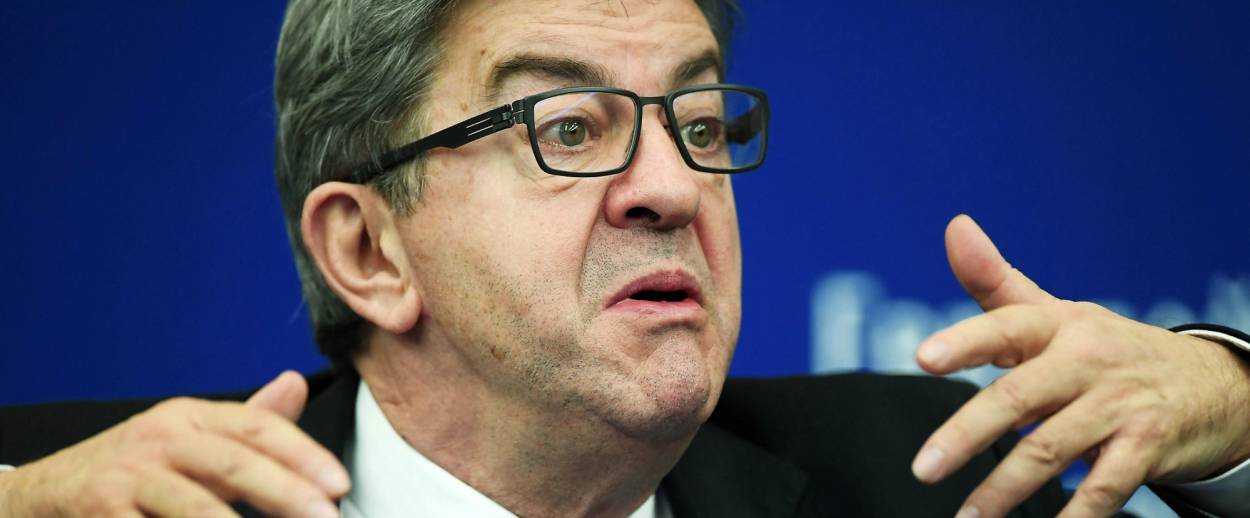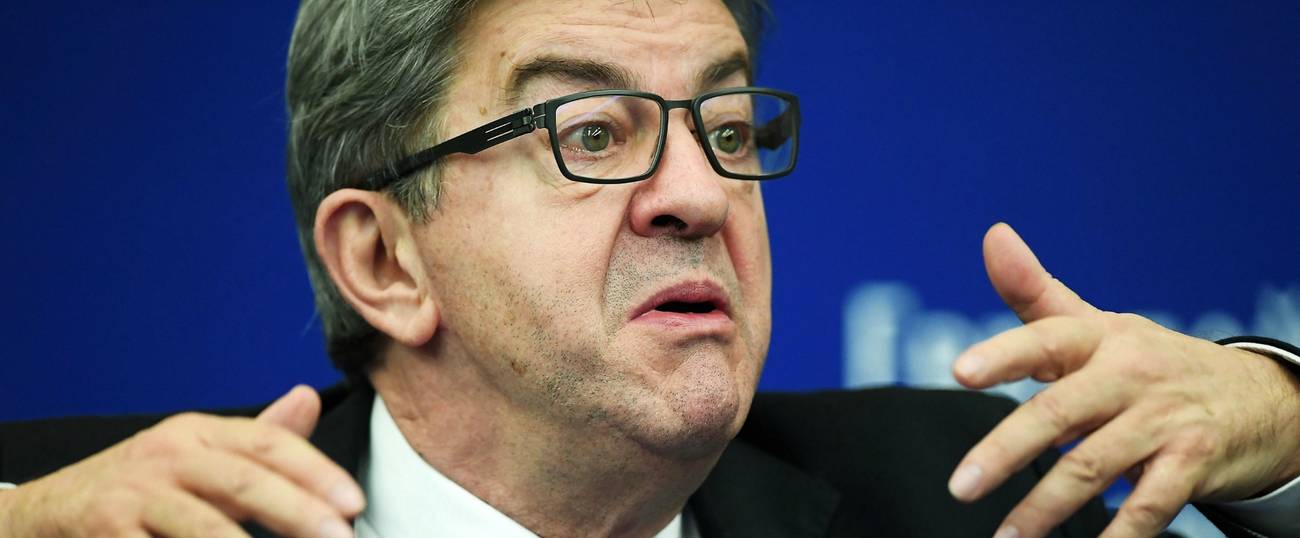The French Left’s Fascist Creep
French presidential candidate and far-left leader, Jean-Luc Mélenchon, is transforming before our eyes into a mascot of totalitarianism




In the Book of Proverbs it is written: You are the company you keep. And so, to find the whiff of putrescence surrounding Jean-Luc Mélenchon, the former French presidential candidate and leader of the extreme-left party, La France Insoumise, one only has to recall Mélenchon’s recent meeting with Jeremy Corbyn at the September 2018 Labour conference in Liverpool to appreciate the nature of the man. As the two called for closer ties to be forged between their parties, it evoked a left that saw the “beauty” in Soviet Communism and not the stench of totalitarianism and tyranny. Alas, I had sounded the alarm in 1977 against these tendencies in Barbarism With a Human Face well before Mélenchon veered down this path …
But now, he had been in a bad way for a while.
Around him hung the air of a bit player and sore loser.
He jabbed below the belt at Macron, Hollande, and others.
There was the matter of his strange alignment with the far right Le Penists on issues as sensitive as anti-interventionism and migrants …
His offensive comments about the umbrella organization of French Jewish organizations …
The Trump-like persecution of journalists and the media, whom he has not forgiven for having been so slow to give him his due …
And the embarrassing moment on television four months ago when France watched him trying to put down two women, Laurence Debray and Nathalie Saint-Cricq, whose effrontery was to push him a little too hard about his bromance with Venezuela’s Nicolas Maduro …
That Jean-Luc Mélenchon had already ceased to be a populist. He had become hateful. Sexist. Servile toward the powerful (Putin, Assad). Indifferent to victims (Ukrainian democrats, slaughtered Syrian civilians, Tibetans). Derisive toward ordinary people whose look happened to displease him (just last week, he grossly aped the accent of a France 3 correspondent). All with an odd undertone that, by mixing popular appeals with a cult of personality, was reminiscent of that old strain of French political culture known as Boulangism.
But now, with his reaction to a series of raids connected with the official investigation of his campaign accounts and personnel practices, he has reached a new stage in his troubling metamorphosis.
As was the case with Michel Onfray last week, it has to be seen to be believed.
You have to see the ‘unsubmissive’ Mélenchon on YouTube at the head of a little band of white-hot supporters, playing the human ram in an effort to knock down the doors of his party’s premises, which are being searched by the authorities.
You have to see him, eyes rolled upward, index finger wagging, threatening an unflappable police representative and a calm public prosecutor.
You have to see him, breathing heavily, nose to nose with these two, shouting, fulminating, spoiling for a fight and, after not getting one, shouting even louder.
In the midst of the scuffle, in the pandemonium of shouting and upended tables, with Mélenchon’s supporters all but daring the police to touch their leader, you have to see the arrival of party spokesman Alexis Corbière, who, gesturing at an officer who has been thrown to the ground but retains his cool, screams, “I told you he was violent.”
“I am the Republic!” exclaims the new Marianne (the symbol of the French Republic), now transformed into a man. My person is inviolable, he moans, apparently at his wits’ end. The scene would be pathetic or ridiculous were it not for the politician’s wild look, the unhinged voice, the air of “stop me before I go too far” that are the true face of the ugly soul.
The most decent of Mélenchon’s party members may begin to worry about what they just saw.
They may, like Corbière, who appeared on television a few hours later, try to calm the waters and run this chilling scene through a laundry cycle of vague excuses.
But something happened during Mélenchon’s raid on the raid.
Something was let loose onto the French political scene, something that will make the resort to force and muscle more acceptable from here on.
It is hard to see, for example, how one might respond to a real rioter who tomorrow, in a restive neighborhood, relies on the example set by Mélenchon and his followers in their tricolor sashes not just to shove but to assault an officer of the law.
The truth is that in a democracy there are few gestures more supremely violent than striking, or threatening to strike, a prosecutor or police officer.
To be more specific, it does not take much for a face to become a target, for words to lead to taunts and then to blows—and that “not much” is just enough, to the extent it inspires imitators and spreads, to move us from the gravity of separate and independent powers, from the seriousness of procedures imposed on the powerful and ordinary alike, in short, to move us from the absolute primacy of the law to hate, rage, and volatile bands propelled not by wings but by fists and fangs.
Such a shift occurred in the 1930s within a communist by the name of Jacques Doriot, the mayor of the Paris suburb of Saint Denis, who, in the throes of becoming a fascist, bellowed his scorn for France’s institutions and its laws.
The works of Maurice Barrès show a similar shift to have been at work in an earlier cohort of unsubmissives who, on the eve of the First World War, moved from Georges Sorel to Charles Maurras and from the extreme left to the extreme right.
That seems to be the point Mélenchon has reached.
When last seen, he was Robespierre. He has reappeared as Doriot.
He set out as one of the sans culottes. But he is coming around to the spirit of the Leagues.
Mélenchon is aware of all this, of course. He knows his French history too well to let any detail of the path he is taking escape him. But there we are. Maybe he’s had enough. Maybe he is not even as angry as he lets on, but finds that time is passing too slowly. No judges, cop, or political hack is going to tell us how to live—that’s what he says. What he means is this: I’ve spent too much time waiting for approval from the likes of Mitterrand, Hollande, Jospin, and all the others who underestimated me; now I’m striking out on my own!
The hour has come, he thinks, rubbing his hands together. But we know very well that the hour he is anticipating will belong not to him but to those who would destroy the republic.
Translated from the French by Steven B. Kennedy
Bernard-Henri Lévy is a philosopher, activist, filmmaker, and author of more than 30 books including The Genius of Judaism, American Vertigo, Barbarism with a Human Face, Who Killed Daniel Pearl?, and The Empire and the Five Kings. His most recent film, Slava Ukraini, premiered nationwide on May 5, 2023.